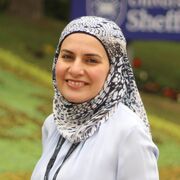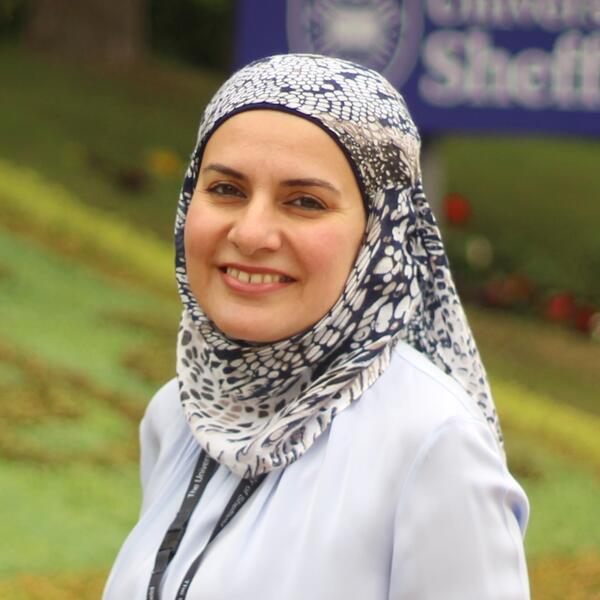Zahraa Al-Ahmady
BSc, MSc, PhD, FHEA
School of Allied Health Professions, Nursing and Midwifery
Senior Lecturer in Pharmaceutics


+44 114 222 2418
Full contact details
School of Allied Health Professions, Nursing and Midwifery
Office B001, Ground Floor
Western Bank Villa
300-302 Western Bank
Sheffield
S10 2TN
- Profile
-
I completed BSc (Hons) in Pharmacy from the College of Pharmacy, University of Baghdad, in 2004. After qualifying as a clinical pharmacist, I moved to the UK to pursue an MSc in Drug Delivery at the UCL School of Pharmacy, where I was awarded the AstraZeneca Prize for best overall performance.
In 2012, I completed my PhD at the Nanomedicine Lab at UCL School of Pharmacy, under the supervision of Professor Kostas Kostarelos, focusing on the design, characterisation, and biological performance of temperature-sensitive vesicles for cancer therapy.
Following my PhD, I joined the European FP7-NMP project NANOSOLUTIONS as a postdoctoral research associate at the University of Manchester, where I investigated the relationship between the structure of engineered nanomaterials and their biological function and safety. I then worked as a research fellow at the North West Centre of Advanced Drug Delivery (NoWCADD) — a collaboration between the University of Manchester, the Nanomedicine Lab, and AstraZeneca — leading research into novel therapeutic and in vivo imaging approaches.
I currently lead the Al-Ahmady Lab Research Group, which explores innovative and efficient drug delivery systems, with a particular focus on neuroimmunology and oncology applications. My work is driven by a commitment to advancing translational science that bridges cutting-edge research with real-world clinical impact.
- Research interests
-
I lead pioneering research in advanced drug delivery technology for oncology and neuroimmunology applications. My group devises novel therapies for precise brain targeting, peripheral immunomodulation and blood cancer. Recent impactful publications in ACS Nano 2019 and Theranostics 2022 showcase impactful and ambitious research, including selective targeting using lipid nanoparticles for intracerebral haemorrhage and peripheral immunomodulation (patent filed). Below are the three main research areas we cover.
New technologies for selective treatment of brain disorders
We are currently investigating BBB alterations after ischemic and haemorrhagic stroke as well as healthy ageing to establish the mechanism and time frame for such alterations. By designing novel therapeutic platforms that can target these mechanisms we demonstrated that we can effectively translocate drug molecules into the lesioned brain and thus maximise therapeutic effectiveness. Below are the projects that we are currently working on in this area:
- A targeted approach to inhibit ferroptosis after intracerebral haemorrhage using liposomal iron chelator.
- Utilising lipid nanoparticles as a biomarker and therapeutic strategy to preserve BBB function in healthy ageing.
- Development and testing of anti-inflammatory targeted therapy for stroke.
Novel therapeutic approaches for peripheral immunomodulation
There is increasing evidence that stroke-associated infections (SAI) have a strong correlation with stroke-induced impairment to the systemic immune response, however, no treatment is currently available for that. Therefore, we are interested in developing novel therapeutic approaches that can ameliorate the immune system dysfunction after stroke and thus could tackle SAI:
- Utilising lipid nanoparticles to enable selective targeting of peripheral immune response to stroke.
- Preventing stroke-associated infections through spleen-targeted nanoparticle treatments.
Engineering advanced drug delivery for cancer
Nanocarriers have demonstrated great potential to control collateral damage and improve the biodistribution of a variety of chemotherapeutic agents. Our current work in this area include:
- The development of an effective nanomedicine formulation for targeting up-regulated cell cycle proteins and understanding the downstream effects of this intervention on multiple myeloma treatment.
- Development of Targeted Therapy for multiple myeloma.
- Grants
-
2024–25: NC3Rs Network Primer Award, £2K (PI), An animal multi-cellular ex vivo multiple myeloma model
2024–25: BBSRC ALERT Equipment Grant, £510K (PI), APP25024: East Midlands Light Sheet Fluorescence Microscopy Facility for the Evaluation of Complex Biological Applications
2023–26: BBSRC in vivo fund, £10K (co-PI)
2023–27: BBSRC DTP studentship, £100K (Co-PI), Development of an imaging biomarker for ageing
2023–27: Brain Research UK Grant, £297K (PI), A Targeted Approach to Inhibit Ferroptosis in a Rodent Model of Intracerebral Haemorrhage
2022–24: BBSRC in vivo support fund, £10K (PI)
2020–24: BBSRC DTP studentship, £100K (PI), The Role of the Neurovascular Unit in Maintaining Normal Blood-Brain Barrier Function and Healthy Ageing
- Teaching activities
-
I am a Fellow of the Higher Education Academy (FHEA) and serve as the Pharmaceutics Lead for the Sheffield Pharmacy Programme.
I regularly supervise laboratory-based research projects for PhD, MSc, MRes, and intercalated medical students.
I have consistently played an active role in teaching, delivering lectures, supervising research, and examining undergraduate and postgraduate programmes across both local and national institutions.
- Professional activities and memberships
-
External administrative leadership
Journal Editor for Frontiers in Nanotechnology and Frontiers in Stroke and Drug Delivery.
Sits on the Reviewer Panel for Future Leader Fellowship (FLF) Scheme (2022-).
Organising Conferences and Meetings: I led the organising committee of the 11th UK and Ireland BBB symposium, Nov 2021 with more than 90 participants.
Public engagement
I am dedicated to public engagement activities to influence public opinion in my field and highlight the significant contribution of individuals, particularly women scientists. Examples include Initiative led by Myself with Colleagues at the University of Nottingham (Soapbox Women in Science) and collaboration with Myeloma UK (RHS Garden 2023), alongside media coverage of our recent impactful research. Some examples are provided below:
